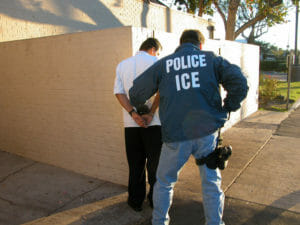Kucinich Tilts at Impeachment
You cannot find a more complete and compelling indictment of the Bush administration than the Ohio representative has presented in his 35 articles of impeachment.WASHINGTON — It is not politically correct to offer a good word about Dennis Kucinich, the elfish, left-leaning congressman from Ohio who regularly runs for president only to drop his quixotic campaigns for the White House so that he might continue representing his working-class district near Cleveland.
Kucinich can be an annoying gnat. He buzzes around the Democratic cloakroom with ideas his party leaders may well agree with in substance — promoting a single-payer system such as Medicare to deliver universal health insurance, for instance — but which they refuse to embrace because they believe them to be too politically risky.
Kucinich’s latest gambit is his introduction of articles of impeachment against President Bush — 35 of them, to be exact — laid out in a five-hour floor speech that was probably heard by no one save the C-SPAN technicians and perhaps a few hundred viewers at home. The charges have no chance of being taken seriously in Congress, where Democratic leaders will dispose of them quickly in a parliamentary move. There is no benefit in throwing the country onto the pyre of partisan flames with Bush set to go quietly away to Crawford in just seven more months, they reason. And this is certainly sensible.
Nonetheless, you cannot find a more complete and compelling indictment of the Bush administration than Kucinich has presented in his articles. They range from the exceedingly obvious, such as those detailed in his Article III: “Misleading the American people and members of Congress to believe Iraq possessed weapons of mass destruction, so as to manufacture a false case for war.” To the specious, presented in Article XII: “Initiating a war against Iraq for control of that nation’s natural resources.”
Kucinich gives us a bleak road map through seven years of deceptions and misjudgments, incompetence and malevolence. There are clear constitutional violations — Article XVII, for example, spells out “Illegal detention: Detaining indefinitely and without charge persons both U.S. citizens and foreign captives.” Then there are the torture and abuse of detainees and the use of secret “black sites” abroad; no one really knows what happened to suspected terrorists once they were sent there.
Being neither a lawyer nor a constitutional scholar, it is impossible for me to tell if the Founders had impeachment in mind for some of the malfeasance Kucinich details. In Article XVI, for example, he reviews the tawdry matter of Iraq contracting, an enterprise so sordid it is difficult to keep track of all the allegations and investigations that should have commanded more of our attention. The administration, Kucinich asserts, “recklessly wasted public funds on contracts awarded to close associates, including companies guilty of defrauding the government in the past, contracts awarded without competitive bidding, ‘cost-plus’ contracts designed to encourage cost overruns and contracts not requiring satisfactory completion of the work.” If that weren’t enough, those chosen to oversee the contracts in some cases “oversaw their business partners.”
The pathologies that Kucinich recounts extend to the administration’s persistent myth-making. There is the matter of misrepresenting the death of former football star Pat Tillman, in which a cover-up was launched to hide the truth that Tillman did not meet a heroic end but was killed by friendly fire. There is the Jessica Lynch fairy tale, in which the former Army private was said to have been brutalized and then saved in a dramatic rescue, a story that also was fabricated.
Besides Iraq, the war on terror and the warrantless wiretapping of American citizens, Kucinich lays out many other stunning abuses, everything from the effort to keep a Medicare actuary from relaying to Congress accurate cost estimates about a new drug benefit, to the U.S. attorney scandal in which top prosecutors were pushed out of their jobs for their apparent refusal to bring political prosecutions that would please Republicans.
Kucinich does not rant, but instead relies almost exclusively on the government’s own documentation of wrongdoing — accounts from inspectors general, congressional testimony, memos that surfaced or were subpoenaed. Some of Kucinich’s charges truly outline high crimes; others just a blatant disregard for the public. And, politically speaking, they are at this point in time irrelevant.
But if you really want to know “what happened” in the Bush era, take a pass on buying former White House press secretary Scott McClellan’s new book. Read Kucinich’s articles of impeachment in the Congressional Record — for free — instead.
Marie Cocco’s e-mail address is mariecocco(at)washpost.com.
© 2008, Washington Post Writers Group
Your support matters…Independent journalism is under threat and overshadowed by heavily funded mainstream media.
You can help level the playing field. Become a member.
Your tax-deductible contribution keeps us digging beneath the headlines to give you thought-provoking, investigative reporting and analysis that unearths what's really happening- without compromise.
Give today to support our courageous, independent journalists.



You need to be a supporter to comment.
There are currently no responses to this article.
Be the first to respond.